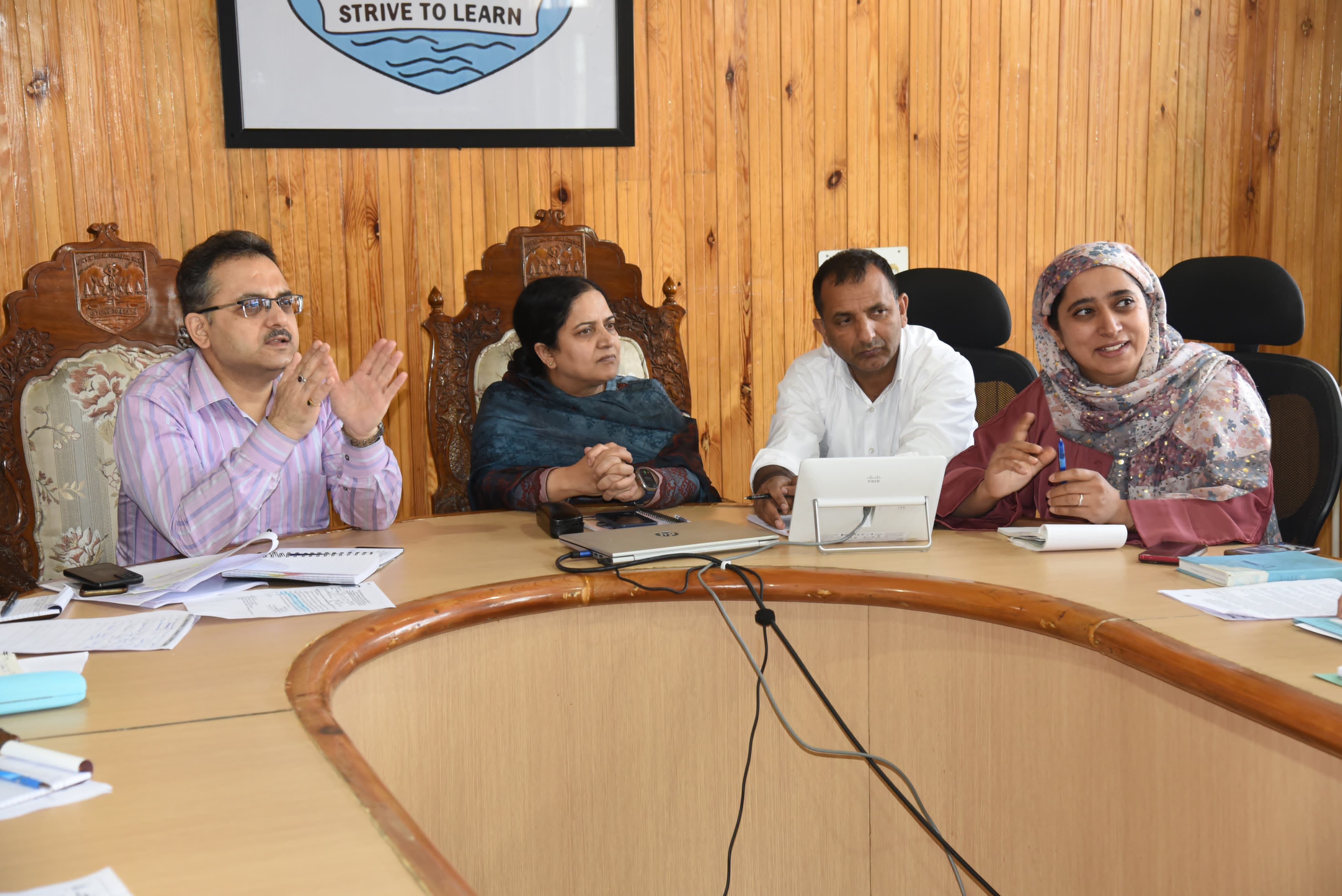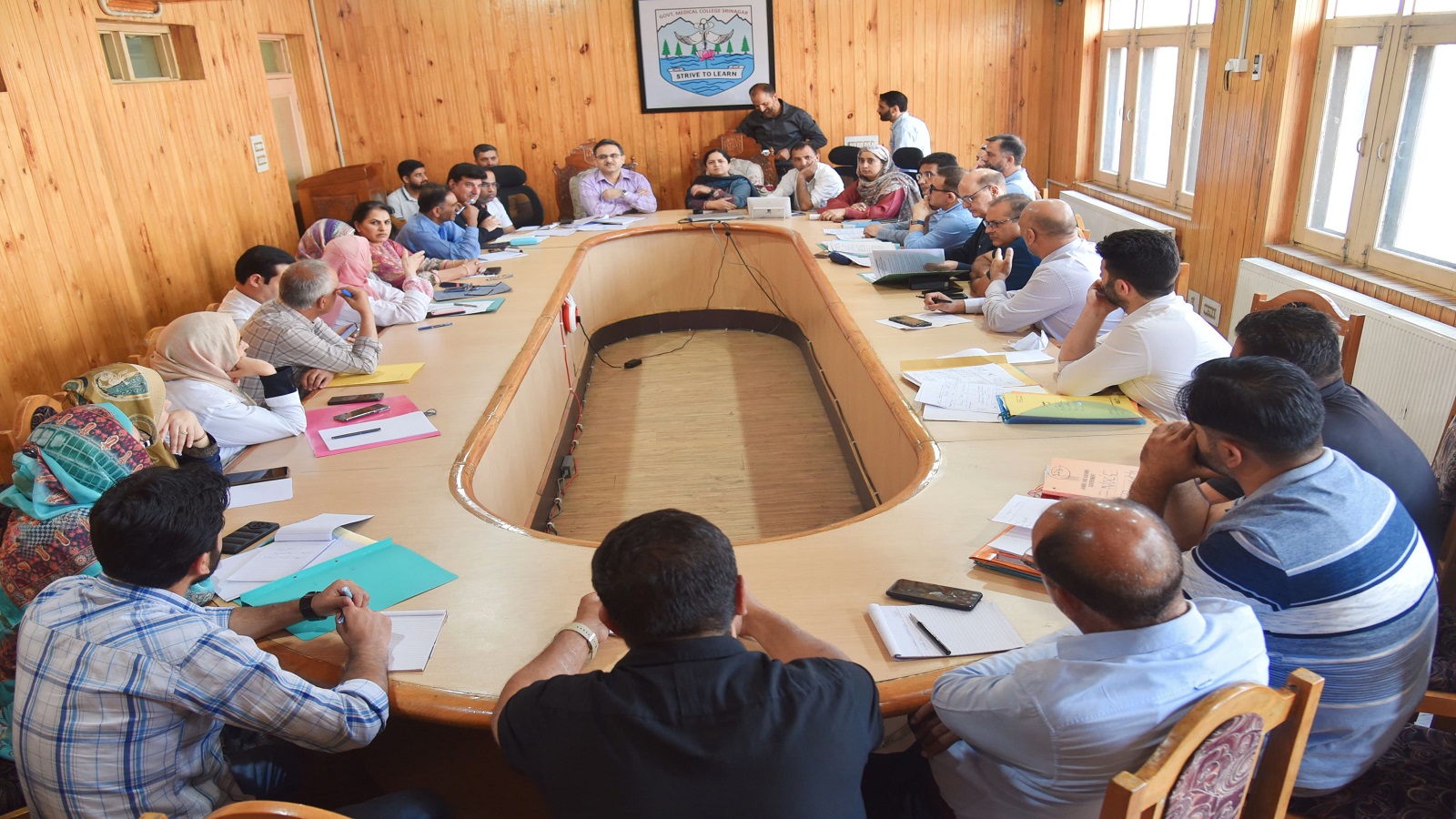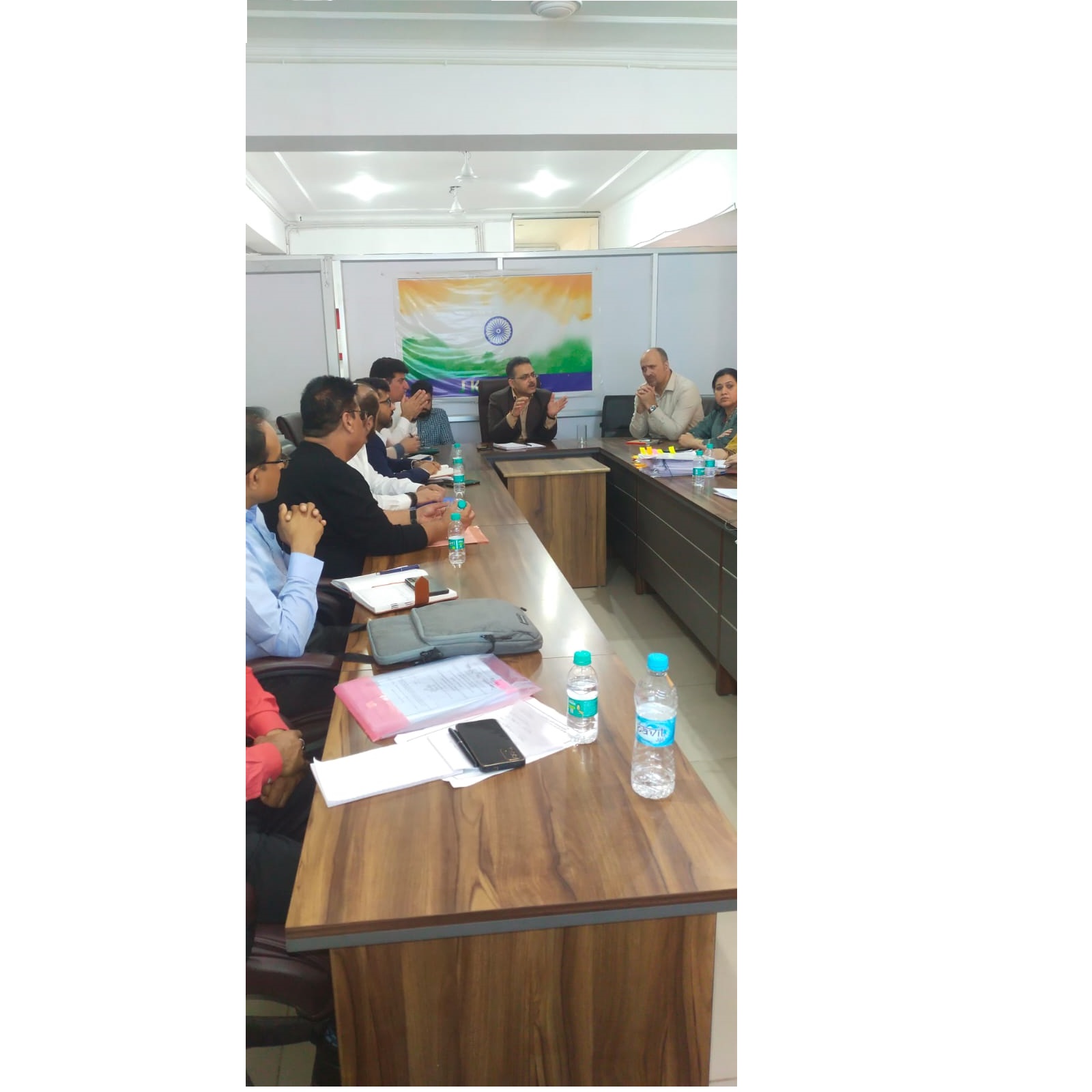Drug Procurement Policy:
1. Introduction : Jammu & Kashmir Medical Supplies Corporation Limited (JKMSC), is a Nodal Agency for procurement of Drugs, Medicines, Surgical and Sutures and Equipment for various Government Medical Institutions in the State. The procurement of drugs and medicine, surgical and sutures is done on the request of Project Directors and Head of the Departments with deposit of funds.
JKMSC adopts the most transparent system in procurement. Utmost care is taken to procure quality drugs at most competitive rates.
Representatives from many States are visiting JKMSC to study its system and adopt the model in their respective States. Government of India and International Funding Agencies are convinced with the procurement system followed by JKMSC and recommended to consider JKMSC as the procurement agency for both external and internal funded projects.
The Polices adopted for procurement of Drugs under different schemes are briefly outlined in this booklet for the reference of the readers and stake hold.
2. Government Act and Rule :
| 2.1 | For procurement under State Government Funds, J&K Transparency in Tenders Act
1998 and Rules 2000(TTIT Act and Rules) are followed :
|
| 2.2 | For procurement under externally funded projects such as World Bank, the guidelines of the funding agency are followed. |
The threshold limits for the types of bidding such as Direct Contracting (DC), National Shopping (NS), National Competitive Bidding (NCB) and International Competitive Bidding (ICB) are as prescribed in the load/credit agreement of each project.
3. Type of Tenders :
| 3.1 | Procedure as per State Act :
|
| 3.2 | Procedure as per World Bank Rules : For procurement under the projects funded by the World Bank, only single cover system is followed as prescribed by the Bank. |
4. Finalization of Essential Drugs and Specifications :
| 4.1 | JKMSC finalize the Essential Drug List for drugs, surgical and suture items every year by getting the requirements from the Government Medical Institutions in the State of Jammu and Kashmir. |
| 4.2 | The requirement so received is placed in the Drug Committee Meeting convened in the month of November every year. |
| 4.3 | The Drug Committee consists of the following members :
|
| 4.4 | The Drug Committee scrutinizes the items in the Essential Drugs, Surgical and Suture List purchased in the previous year and analyses the slow moving, nonmoving and out-dated items and recommended for the deletion of such items. |
| 4.5 | In addition, the committee also suggests to include certain items of Drugs, Surgicals and Sutures suggested by the institutions based on the essentiality. |
| 4.6 | Final list of Essential Drugs, Surgical and Suture items is consolidated based on the decisions taken in the Drug Committee meeting and the specifications of each item is arrived with Pharmacopeia standards. |
| 4.7 | The Drug Committee also decides on the procurement quantity for the items included in the Essential Drug List by analyzing the last year purchase and utilization. |
Invitation of Tenders :
| 5.1 | Notice Inviting Tenders (NIT) is published in the newspapers and the State tender bulletin as prescribed in the Act, rules and Government orders. NIT is also published on the websites viz http://jktenders.gov.in. |
| 5.2 | The advertisements are in the prescribed standard formats as applicable for State Tenders and externally funded project tenders. |
| 5.3 | The tender notifications are also sent to all the State Drug Controllers, Pharma Manufacturing Associations and Pharma publications to encourage more participation. |
| 5.4 | The sale period of bidding document is :
|
6. Eligibility Criteria :
| 6.1 | Tenderer shall be a manufacturer, having valid manufacturing license or direct importer, holding valid import license. Distributors/Suppliers/Agents/Loan Licensee are not eligible to participate in the Tenders. |
| 6.2 | Average Annual turnover in the last three years and turnover for the last year Should not be less than the amount prescribed inn the tender document. |
| 6.3 | Tenderer should have at least 3 years market standing as a manufacturer/ Importer for each drug quoted in the tender and tenderer should have permission to manufacture the item of drug quoted as per specification in the tender from the competent authority. |
| 6.4 | Tender should not be submitted for the product/products for which the concern/company has been blacklisted either by JKMSC or by any other State/Central Government’s organization. |
| 6.5 | The Company/Firm which has been blacklisted either by Tender Inviting Authority or by any State Government or Central Government Organization should not participate in the tender during the period of blacklisting. |
| 6.6 | The Information and supporting documents to be furnished by the bidders in Cover A :
|
| 6.7 | The information to be furnished by the bidder’s inn Cover B:
|
| 6.8 | The bidders are not permitted to alter the specification or unit size. |
7. Tender opening :
| 7.1 | No bid received after the prescribed time is accepted. Late bids received by post are returned unopened. |
| 7.2 | Tenders are opened in the presence of the bidders at the scheduled time, date and place indicated in the bidding document. |
| 7.3 | Attendance of the authorized representative of the bidders are recorded with their signature before opening of the bids. |
| 7.4 | Tenders are opened by a committee of members nominated by the tender inviting authority. |
| 7.5 | The tenders are opened one by one, all the price bids ( in case of two cover system) are identified and placed in a separate sealed cover, signed by the representatives and preserved safely. |
| 7.6 | Each bid is initialled by the members of tender opening committee. |
| 7.7 | Minutes of the tender opening is prepared in the prescribed format for record. |
8. Tender Evaluation :
| 8.1 | Tender evaluation process comprises of Technical evaluation and commercial evaluation which is carried out either sequentially nor simultaneously as required by the relevant tender procedure. |
| 8.2 | The technical bids are opened and scrutinized using a check list, by a team of officials. |
| 8.3 | Evaluation are done in the presence of the Tenderers or their representatives. |
| 8.4 | After preliminary evaluation the tender documents are once again scrutinized in the Head Office for the specifications etc. In case of any discrepancy noticed during the scrutiny, letters are issued to the tenderers to submit the clarifications/additional documents. |
9. Inspection of Manufacturing Premises :
| 9.1 | The manufacturing premises of the tenderers who are participating 1st time in the JKMSC tender and those whose premises were inspected and empanelled 3 years before are compulsorily inspected for the compliance of Good Manufacturing Practices(GMP) as per Revised Schedule M of Drugs and Cosmetics Act and for their production capacity. |
| 9.2 | Inspection team is concerned with the officials from the Directorate of Drug Control and End User Departments such as Director of Medical Education And Rural Health Services. The teams are sent for inspection to the manufacturing premises with a check list for verification of the GMP compliances as per Revised Schedule M of Drugs and Cosmetics Act and capacity of the tenderer. |
| 9.3 | On the recommendations of the Inspection Team the tenderer is considered for the price bid opening. |
10. Price Bid Opening :
| 10.1 | Those tenderers who were shortlisted on technical evaluation and on the inspection of the manufacturing premises are called for Price Bid opening. |
| 10.2 | The price bids of shortlisted bidders are opened on the prescribed date in the presence of the bidders or their representatives. |
| 10.3 | The price bids of the shortlisted bidders are opened one after another and the prices quoted are read aloud. |
| 10.4 | The price bids of the bidders who are not shortlisted on technical evaluation are not opened. |
| 10.5 | The minute of price bid opening is prepared in the prescribed format for record. |
11. Preparation of Provisional Lowest rate and Tenderer :
| 11.1 | The Provisional L1 rates for all the eligible items is arrived at on the same day of the price bid opening and Provisional L1 rates are published in the Website and in the Notice board of JKMSC. |
| 11.2 | To expedite the processes Tenderers are also requested to submit the soft copy of the price along with the price bid of the tender. |
12. Price Evaluation and Negotiation :
| 12.1 | Negotiations are held only with L1 bidders after comparing the rates Quoted with the previous year purchase rate/market rate for its reasonableness. |
| 12.2 | No negotiation is permitted, for the tenders called for under World Bank Procedure. |
13. Approving of the Rates and Tenderers :
| 13.1 | If the value of the drug is up to Rs. 50.00 lakhs, the tender is approved by the Managing Director for placement of Orders. If the value of drug is more than Rs, 50.00 lakhs, the tender proposal is placed the board of JKMSC through the tender committee for approval. |
| 13.2 | For the 1st NCB and all ICB tenders of World Bank Projects, prior review by the World Bank is mandatory and hence orders are placed only after issue of No Objection Certificate by the World Bank. However, for projects such as RCH-II, prior approval is not mandatory, even though the tender procedure is as per World Bank Guidelines |
14. Matching of Lowest Price :
| 14.1 | The tenderers who have participated in the tender for the product and found eligible on technical evaluation are requested to offer their willingness to match the L1 rate. The tenderers are also requested to indicate the matched items in the schedule of the agreement. During this process no bidder is permitted to offer a rate lesser than the negotiated L1 rate. |
| 14.2 | The matched suppliers are kept as reserve e, in case of any additional requirement and in case of exigency; orders are placed on issued to the matched tenderers. |
15. Matching of Lowest Price :
| 15.1 | After approval of L1 rate and tenderers by the Boards, Acceptance Letters are sent to the tenderers for confirmation of the approval of their negotiated rates. |
| 15.2 | Contract agreement is executed after collecting Performance Security as prescribed in the tender document is obtained from the successful bidders. |
16. Right to Reject the Tender :
| 16.1 | After negotiation with the tenderer and before passing the order accepting a tender, if the Tender Accepting Authority decides that the price quoted by such tenderer is higher by the percentage as may be prescribed over the schedule of rates or prevailing market prices, he shall reject the tender. |
| 16.2 | The Tender Accepting Authority before passing the order of accepting a tender may also reject all the tenders for reason such as changes in the scope of procurement, lack of anticipated financial resources, court orders, calamities and other unforeseen circumstances. |
| 16.3 | In the case of World Bank tenders, the Bank’s prior approval shall be obtained before rejecting all bids and soliciting new bids. |
| 16.4 | If any drugs which are not approved by the Tender Committee and the Board for various reasons, retenders are invited for those items and the same is placed once again in the Tender Committee and the Board for approval as per the value of the item. |
17. Placement of purchase orders for Drugs, Surgicals and Sutures :
| 17.1 | The essential drugs and surgicals are classified as fast moving and slow moving items. This decision has been taken to have more concentration on the fast moving items. |
| 17.2 | The purchase orders are placed once in two months for the fast moving items and for the slow moving items orders are placed once in three or six months in a year. However the existing stock is taken into account while placing purchase orders. |
18. Process of placing the Purchase Orders :
| 18.1 | The tender quantity is arrived by taking immediate 12 months consumptions, stock available in warehouses and pipeline stocks. |
| 18.2 | JKMSC always maintains 4 months physical stock in its Warehouses and 2 months stocks inn pipeline for all the drugs. |
| 18.3 | Tender quantity as worked out above is tentative requirement and may be increased and decreased by the Tender Inviting Authority depending on the actual need. Through this tentative quantity is indicated in the agreement, the successful tenderers are required to supply the drugs only on the basis of the purchase order issued by the Tender Inviting Authority. Any supply without a valid purchase order is not acceptable by the corporation. |
| 18.4 | On receipt of purchase order, the suppliers should upload on the website/fax his confirmation for the receipt of the purchase order within 3 days from the date of its receipt. The suppliers should also host on JKMSC website, within 7 days, the details of the supply schedule and the same should be faxed and mailed to JKMSC. |
| 18.5 | The suppliers are allowed time up to 60 days for supplying the quantity of drugs mentioned in a particular purchase order. Beyond 60 days a further 30 days time is allowed to execute the order with liquidated damages. |
| 18.6 | If the L1 tenderers are having unexecuted order even after 60 days, orders may be placed with matched tenderers or L2 tenderers for supplying the unexecuted quantities and difference of cost is deducted from the L1 tenderers. |
19. Embossment of Logogram to avoid Pilferage :
| 19.1 | Tenders for the supply for drugs, with the logogram either printed or embossed on tablets and capsules, bottles etc., as per the design given in the tender documents. |
| 19.2 | All tablets and capsules have to be supplied in strip or blister packing with printed logogram and shall also conform to Schedule P1 of the Drugs & Cosmetics Act & Rules. Affixing of stickers and rubber stamps is not accepted. |
| 19.3 | Vials, Ampules and Bottles containing the items tendered for should also carry the logogram. |
20. Release of Payment and Penalty Deductions :
| 20.1 | JKMSC process the bills after the receipt of 70% of the ordered quantities provided supplies have passed the quality tests. |
| 20.2 | An amount equivalent to 1.5% of the supply value shall be deducted towards handling and testing charges. |
| 20.3 | If the supply reaches the District Drug Warehouse after 60th day and up to 90th day from the date of purchase order, liquidated damages is levied at 0.5% per day for delayed supply up to a maximum of 15%. |
| 20.4 | If there is any unexecuted order after 90th day from the date of issue of the purchase order, the order shall stand cancelled automatically after levying penalty @ 20% on the value of unexecuted quantity. |
| 20.5 | If the supplies are fund to be deviated from any condition of printing of proportionate size logograms etc., separate damages are levied @ 20% of the supplied value. |
21. Black Listing of the Product and Suppliers :
| 21.1 | If the supplier fails to execute at least 50% of the ordered quantity mentioned in single Purchase order and such part supply continues for three consecutive Purchase orders, then the supplier become ineligible to participate in any of the tenders for the particular items of drugs/medicines for a period of one year, immediately succeeding the year in which the above Purchase Orders were placed. |
| 21.2 | If the Successful tenderers fail to execute the agreement to perform the obligations under the tender conditions and commit default in the performance of the contract, such tenderers are blacklisted for a period of 5 years. |
| 21.3 | The tenderers who have withdrawn after participating in the tender become ineligible to participate in the tenders for a period of 5 years. |
22. Appeal :
| 22.1 | As per TTIT Rules 2000 the Tender Inviting Authority shall ensure confidentiality of the process of tender evaluation, until orders on the tenders are passed. Therefore, tenderers shall not make attempts to establish unsolicited and unauthorized contact with the Tender Accepting Authority, Tender Inviting Authority or Tender Scrutiny Committee after opening of the tender and prior to notification of the award and any attempt by any tenderer to bring to bear extraneous. Pressures on the Tender Acceptance Authority shall be sufficient reason to disqualify the tenderer. |
| 22.2 | Any tenderer aggrieved by the order passed by the Tender Accepting Authority on the acceptance of the tender may appeal to the Government within 10 days from the date of receipt of order and the Government shall dispose the appeal within 15 days from the date of receipt. In disposing of an appeal, the Government may after giving the party an opportunity of making its representations, pass such fan order thereon as they may deem fit. The Order of the Government on such appeal shall be final. The Government, pending the exercise of their powers, pass such interlocutory orders as they deem fit. |
| 22.3 | In the case of World Bank tenders, within 2 weeks of receiving the Bank’s no objection to the recommendation of the contract award, the purchaser shall publish in UNDB online and in Dg market the results. |

.jpeg)
.jpeg)
.jpeg)
.jpeg)
.jpeg)
.jpeg)
.jpeg)
.jpeg)
.jpg)
.jpg)
.jpg)
.jpg)
.jpg)
.jpg)


.jpg)
